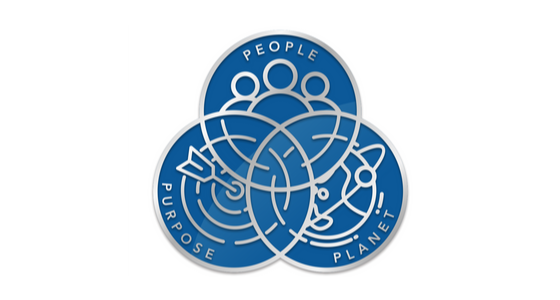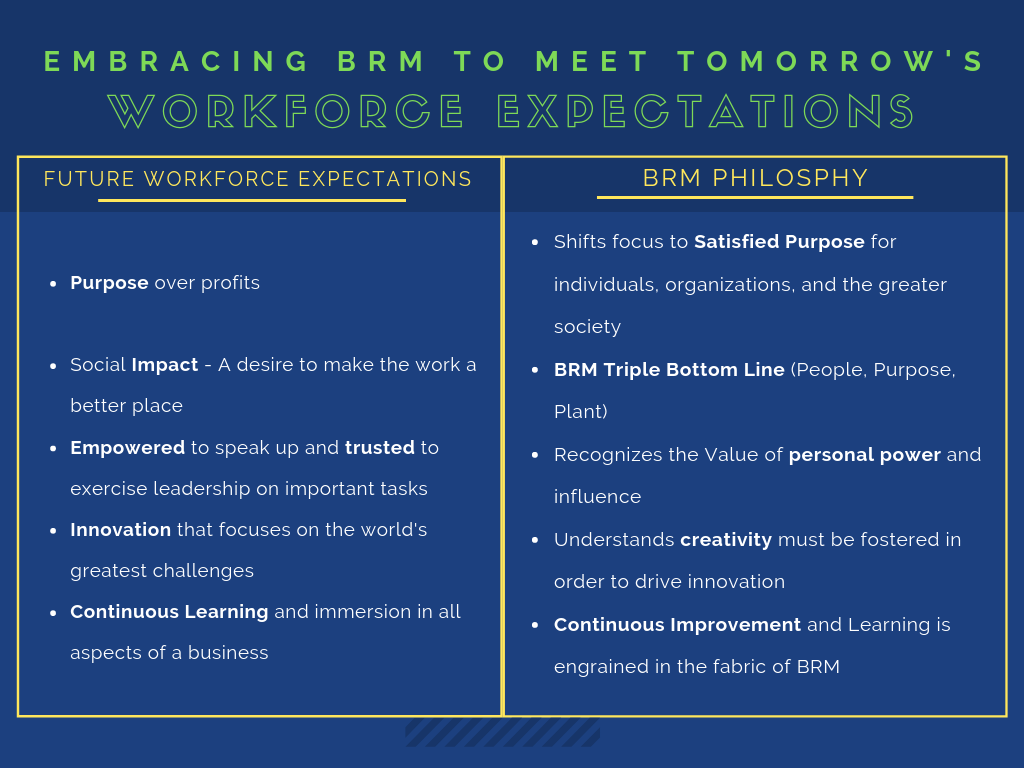Coming Full Circle with BRM Philosophy: New Workforce Generation

The winds of change are gusting amidst the vast majority of the current workforce and those now entering it. Particularly, recent college graduates entering the workforce want more from their employers than just a shiny benefits package.
According to a study conducted by the Society for Human Resource Management, 94% of future generations want to use their skills to benefit a cause. Future generations include those currently making up the majority of the workforce not approaching retirement and recent college graduates just entering the workforce.
Therefore, this overwhelming demand for greater purpose in the workplace cannot be ignored.
In addition to working for a cause, changing workplace expectations include:
- Innovation (creativity)
- Making an Impact (purpose)
- Flexible Schedules (work/life balance)
- Corporate Learning Opportunities (career advancements)
- Responsibilities (trust)
Thus, in order to address new workforce expectations and attract talented individuals, organizations need to gain further insights on these expectations while continuing to satisfy purpose.
Purpose Encompasses Profit
Overwhelmingly, top talent from around the world are asking potential employers, “What are you doing from a social impact standpoint? How is your business reinvesting in the community?”
The world’s future workforce generation is looking for more than profitable companies. They’re searching for compassionate, innovative, and sustainable companies. Ultimately, they want to know their valuable skills contribute to something bigger than themselves and seek out like-minded organizations.
Business relationship management (BRM) philosophy rises up to meet this emerging demand and embodies it within its triple bottom line; People, Purpose, and Planet. Although profit (embodied in Purpose) is not the only bottom line, the philosophy recognizes that profit is not inherently bad. Profits pay the bills which allow businesses and people to thrive and drive a greater impact in the world.
Furthermore, the triple bottom line not only supports planet and our communities, it also supports organizations aiming to attract talented individuals within current and future workforce generations.
Embracing BRM to Meet Tomorrow’s Workforce Expectations
Purpose lies at the heart of the expectations of the new generation. Intrinsically, this converges perfectly with the aim of BRM Philosophy.
Therefore, in order to meet the expectations of our future global workforce, we embrace BRM as a role, discipline, capability, and philosophy. Ultimately, this empowers the entire workforce to change the world for the better.

BRM Philosophy represents the changing of a culture within our global workforce and brings these emerging workforce expectations full circle to achieve the new triple bottom line of people, purpose, and planet.
PepsiCo: An Epic Journey of Embracing BRM
It was late 2016 when PepsiCo IT Senior leaders recognized the need to drive a strategic relationship between the business sectors and IT. The recognition of this need led to the implementation of the BRM Practice within PepsiCo IT.
After senior leaders from PepsiCo sought help from Aaron Barnes, CEO of BRM Institute, Tyrone Green and his team joined the Online Campus and became members of the institute. Although resistant at first, Tyrone quickly came to understand the crucial importance of converged language to enrich strategic partnerships and fully understand the BRM role.
Then, PepsiCo’s IT department embarked on a transformational journey to create business capability roadmaps, develop a value framework, and undergo training on BRM terminology. Tyrone recalls that, after a while, other sectors of the organization began to realize that IT was showing up differently.
Tyrone’s department then began to hand out BRM pamphlets to share socially within PepsiCo about what IT did differently. Slowly, as they layered value in with business operations, the idea caught on. Suddenly, it seemed like everyone was talking about value!
PepsiCo has since incorporated BRM core disciplines into its existing models and processes, and their goal is to certify all 250 BRMs through BRM Institute.
After roughly three years of embracing BRM Philosophy, PepsiCo is now one of the largest supporters of business relationship management as a role, capability, and organizational philosophy.
Tyrone Green, PepsiCo’s IT Senior Director with the company for 19 years, is also the Global BRM Practice Lead for the entire organization. Today, he leads more than 250 BRMs company-wide.
If you’d like to hear more about this story and how your organization can meet new workforce expectations, listen to Tyrone’s full webinar, Coming Full Circle with BRM Philosophy: New Generation!
To become a member of BRM Institute, take a closer look at our individual and organizational plans tailored to your specific needs wherever you may be in your BRM journey!
